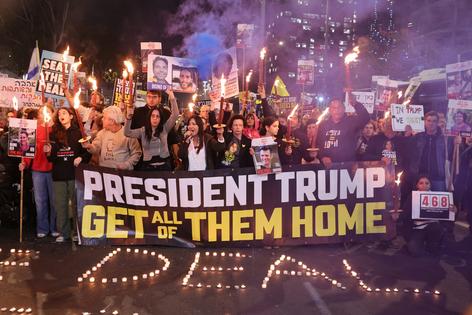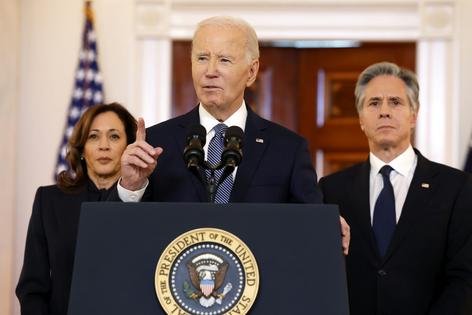Israel-Hamas deal shows limits of US influence – and the unpredictable impact of Trump
Published in Political News
A ceasefire deal between Israel and Hamas is expected to take effect on Jan. 19, 2025, according to U.S. Secretary of State Antony Blinken. Even as Israel’s cabinet delayed until Jan. 17 its vote to ratify the complex deal, Blinken said he is “very confident this is moving forward.”
The U.S., Qatar and Egypt helped broker the deal, which followed negotiations that had many starts and stops in 2024. Representatives of the Biden administration and President-elect Donald Trump worked together to advance the agreement, and both leaders took credit for the expected return of an estimated 100 Israeli hostages – both living and dead – and a complete ceasefire in the Gaza Strip.
Amy Lieberman, a politics and society editor at The Conversation, spoke with Gregory F. Treverton, who served as the chairperson of the U.S. National Intelligence Council during the Obama administration, to better understand what the United States’ role in this agreement says about American influence in the Middle East.
So far, the U.S. has not had very much influence in attempts to end the conflict. One reason is that Israeli Prime Minister Benjamin Netanyahu appears allergic to taking advice from the U.S. What is striking now is that some combination of Donald Trump coming to power and Joe Biden leaving office has made a difference – and possibly made Netanyahu more willing to take political risks with his governing coalition and to sign on to the deal.
It is more or less the same kind of deal that the U.S. presented in May 2024. So, it is hard to know whether Trump moved the dial by his past threats to punish Hamas and by pressuring Netanyahu, or whether Hamas felt like it has been weakened and lacks outside support from weakened allies like Iran. Or a combination of these factors.
We also know that there are some last-minute hiccups with the deal, so it isn’t over yet. But there is real progress and hope, and that reflects a lot of the Biden administration’s hard work over the past 15 months.
The proposed deal has three phases that will last more than four months. Because it starts doesn’t mean it will get to the end. And the agreed end is very, very vague, with a revamped Palestinian Authority taking over Gaza – something Netanyahu has said he doesn’t want.
The deal has been brokered largely by the U.S., Egypt and Qatar. There is not a serious international monitor of the deal beyond the political pressure of these countries.
It is not unprecedented. Typically, during ordinary transitions between administrations, there is a lot of cooperation and working together.
What is unusual is that you would perhaps not have expected this kind of collaboration, given the hostility between Trump and Biden and their teams. Biden has said that his administration and the Trump team have been “speaking as one team.” In that sense, it is a bright spot in U.S. politics as of late and returns to a more normal pattern in U.S. foreign policy where there has been cooperation between outgoing and incoming administrations.
It is unusual that Steve Witkoff, Trump’s designated Middle East special envoy, went on his own to meet with Netanyahu in January and reportedly influenced Netanyahu’s decision to accept a deal that he previously rejected. Many special envoys require confirmation by the Senate, though they can hold the post temporarily without it. They also need security clearances, so that limits some of the things they can do.
It is striking that for all his efforts, Biden seemed to have so little influence on Netanyahu. This has been very difficult for Biden politically. He wanted to get a ceasefire deal done, but he also wanted to stop the suffering in Gaza and didn’t want to look like he was giving Israel a blank check to do whatever it wanted.
In the process, the U.S. has been labeled as partially responsible for the tens of thousands of Palestinian deaths, which some people would call a genocide. This has done a lot of damage to the United States’ global reputation, and that will take some time to repair.
Trump is entirely unpredictable. He may continue to pressure Netanyahu or he may decide that Netanyahu can do whatever he wants.
In some ways, I think it shows the United States’ diminished influence on the Middle East. On the other hand, the geopolitics of other regional conflicts and political changes, like the fall of the Assad government in Syria and the weakening of Hezbollah and Iran over the past year or so, have given certain opportunities to Israel, and therefore the U.S. This includes continuing the Abraham Accords, an agreement the Trump administration helped negotiate in 2020 to normalize relations between Saudi Arabia and Israel.
The Saudis have been clear that they won’t make an agreement with Israel if there is not a state or something else designated for the Palestinians. It may turn out that this current deal, if implemented, offers enough for the Palestinians for the Saudis to also make an agreement with Israel.
This article is republished from The Conversation, a nonprofit, independent news organization bringing you facts and trustworthy analysis to help you make sense of our complex world. It was written by: Gregory F. Treverton, USC Dornsife College of Letters, Arts and Sciences
Read more:
Gaza ceasefire and hostage deal: Why now and what next?
US secretary of state has an expansive job that could make or break peace deals and key foreign alliances
Why Israel and Hezbollah reached a ceasefire now − and what it means for Israel, Lebanon, Biden and Trump
Gregory F. Treverton does not work for, consult, own shares in or receive funding from any company or organization that would benefit from this article, and has disclosed no relevant affiliations beyond their academic appointment.



































































Comments